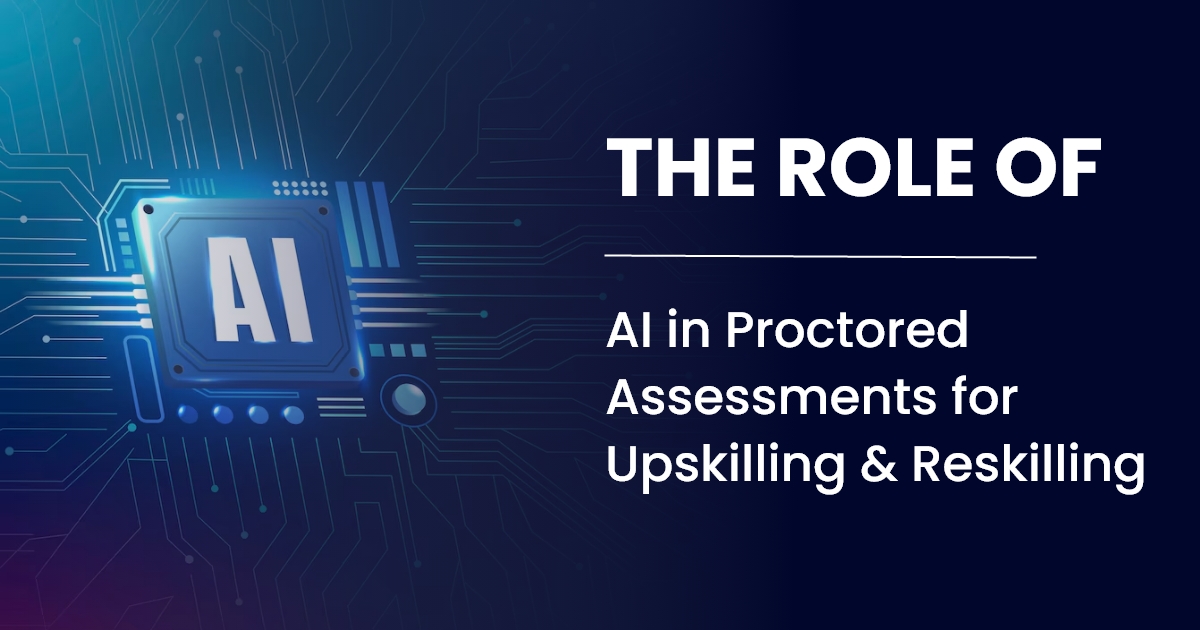In this fast-changing environment, up-skilling and re-skilling have become a way of life for professionals. When new advancements are adopted, employees and professionals in certain industries must keep sharpening their skills to meet the competition. Among the agents of transformation, AI proctored assessments make fair, secure, and scalable evaluation of candidates possible in the online domain of learning. From here, AI Proctoring is transforming how organizations and institutions assess learners in the world of remote education and digital certification. This blog explains how AI functions in proctoring assessments and what influence it has on up-skilling and re-skilling programs.
How AI is an Enhancing Proctored Assessments
- Guaranteeing the Integrity of the Examination with AI Proctoring
The integrity of any online assessment is a major challenge. While human invigilators are required to uphold integrity in traditional exam settings, the AI proctoring solutions can:
- Monitor candidates in real-time utilizing face detection and behavioral analysis.
- Identify actions that might be suspicious, such as more than one face, screen switching, or unauthorized material.
- Flag anomalies automatically to reduce the need for human proctors.
This technology guarantees assessments are fair and credible, and the certification and skill validation become trustworthy.
- Scalable and Cost-Effective Assessments
AI detection and proctoring assessments eliminate the need for physical test centres and human invigilators, thereby achieving
- Lower operational costs for institutions and employers;
- Scalability- enabling thousands of candidates to sit for a test at the same time; and
- Round-the-clock accessibility- making learning and assessment flexible for professionals.
This means that businesses with an active investment in reskilling their workforce can conduct their assessment of employees faster and cheaper.
- AI-Driven Personalization and Adaptive Assessments
AI is not just a test proctor; it also motors learning itself. Adaptive assessment allows AI to do the following:
- Real-time performance analysis for all candidates.
- Adjust the difficulty according to the strength and weakness of every individual.
- Offer immediate feedback, helping learners to understand what areas need improvement.
In the end, this data-driven process ensures that as each professional goes through such an experience, they have a specific or general experience that will best aid in their infinitesimal growth stages.
- AI-Driven Skill Gap Analysis: Employers
AI-led assessments provide close insights into worker skill gaps for employers. AI is able to determine skill-voids by test performances and offer solutions to rid the workforce of errors.
The HR department can benefit from this analysis to receive pertinent data with which to make structured decisions on hiring and training. Progress can be mapped over time according to the ideal reskilling pathway.
It allows an organization to have smartly earmarked learning engagements to help employees gain skills in high demand.
- Improved Candidate Experience: AI
AI makes assessment intake and completion more simple, delightful, and stress-free for candidates. Features include, for example:
- Automated ID verification quickens authenticating.
- Voice/facial recognition eliminates long login times.
- Live chat allows for quicker, technical help.
Candidates pursuing their up-skilling or re-skilling programs stand to benefit from this in terms of higher visibility and a better learning experience.
Future of AI in Proctored Exams
So AI is going to build a path for future proctored assessments,
- wherein it would involve improvements in biometrics and behavioural analytics that would better detect malpractice;
- tie in with VR and AR for skills assessment;
- and probably involve AI-powered career choice recommendations through tests that tell not just where you stand but what you’ll probably enjoy as a working career.
Innovation will make sure that we further reinforce the role of AI in creating a future-ready workforce.
Conclusion
AI-enabled proctored assessments facilitate up-skilling and re-skilling through secure, scalable personalized evaluations thus benefiting organizations, educators, and students alike. Indeed, by fairness and providing real-time insights and adaptive learning paths, it gives value to all.
AI will continue to play a vital role in shaping the future of skills development as businesses and institutions embrace digital learning. It’s time to make a revolution with AI-powered proctoring as credible, efficient, and data-driven assessments empower professionals across the globe.
So, are you ready to infuse AI into your assessment process? Check out Think Exam’s AI-powered proctoring solutions right now!








